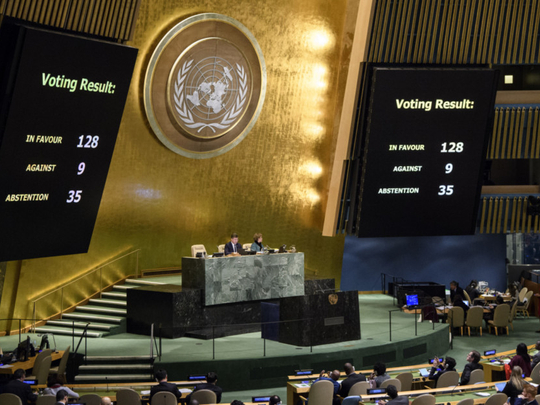
There was no doubt in anyone’s mind that Jordan would vote for the resolution on occupied Jerusalem at the United Nations General Assembly in spite of the threat by the US Ambassador to UN, Nikki Haley, and later by President Donald Trump himself that Washington would be watching, taking names and remember when the time comes.
Jordan is one of a handful of regional countries that have become dependent on US military and financial aid. In fact, it is third on the list after Israel and Egypt, receiving an estimated $1.2 billion (Dh4.41 billion) in 2017. For a country whose economy is reeling from the burden of hosting more than 1.4 million Syrians, including 600,000 registered refugees, and suffering from sluggish economic growth, endemic budget deficits and a whooping $37 billion public debt, US financial support is strategically important.
But Jordan could not afford to give in on an issue that has become a cornerstone of its national security — the two-state solution that would facilitate the birth of an independent Palestinian state in the West Bank and Gaza with East Jerusalem as its capital.
Jordan’s relationship with the Palestinian issue is unique: It was Jordan that had control and later sovereignty over the West Bank and East Jerusalem from 1948 until June 1967. Many of the residents of these territories are Jordanian citizens. In addition, Jordan is host to the largest number of Palestinian refugees and displaced citizens, making a final peace settlement especially important in deciding the fate of over two million registered refugees.
Furthermore, under the 1994 peace treaty between Jordan and Israel, the two sides had agreed on the parameters required to settle the Palestinian issue and the fate of East Jerusalem was to be settled through negotiations. And last but not the least, under the same treaty, Israel had recognised Jordan’s special role as custodian of the Muslim holy sites in the Old City. Even when Jordan decided to end legal ties with the West Bank in 1988, it maintained supervision and administration of Muslim waqf (endowment).
Such responsibility had triggered numerous confrontations between Jordan and Israel, especially in the past five years and as recently as last July, over repeated incursions by Jewish colonists and Israeli officials of Al Haram Al Sharif, which radical Jewish groups claim is the site of their destroyed temple.
With this in mind it would have been impossible for Jordan, of all countries, to bow to US threats and not vote for the UN resolution. It was a precarious move, but it would be hyperbolic to believe that the Trump administration would take punitive measures against Amman.
Jordan has always been an important pro-western, and particularly US, ally in a turbulent region. Whether it was during the Cold War years or after, Amman had been gaining importance for Washington as a stable, moderate and instrumental player in Middle Eastern politics. It was always viewed to have a major role in a final status formula to end the Israeli-Palestinian conflict and to a larger extent the Arab-Israeli struggle.
Therefore, Jordan had managed to cultivate friends and supporters inside the US Congress. It had played a pivotal role in the war against extremists, especially at the intelligence sharing levels. More recently, its importance as a logistical asset for US and other coalition members has been increasing. And while relations with the right-wing Israeli government have been waning, Israel’s security and military brass remain committed to their eastern neighbour’s stability.
So it is highly unlikely that the Trump administration will seek to slash its economic and military support for Jordan. For one thing, Congress and the Pentagon would oppose such a move that would weaken America’s presence in the region. But it would be foolish to treat this administration as a typical one. Jordan’s leadership had differed with some policies of the Barack Obama and George W. Bush administrations, but US commitment to the kingdom was never in doubt.
But even if the worst scenario happens and the Trump administration carries out its threat and begins to reduce aid to some countries in retaliation, it does not mean that Jordan would collapse the following day. Amman has followed a creative foreign policy where it had managed to maintain good relations with neighbours in addition to powerful players such as Russia. It still enjoys the backing of the European Union and its economic recovery is not impossible.
But the US administration has to understand that Jordan cannot afford to compromise on the Palestinian issue when Israeli far-right ministers make direct threats and discuss publicly plans to resolve the conflict at the kingdom’s expense. For Amman, this is an existential challenge that they have no choice but to confront.
Osama Al Sharif is a journalist and political commentator based in Amman.









